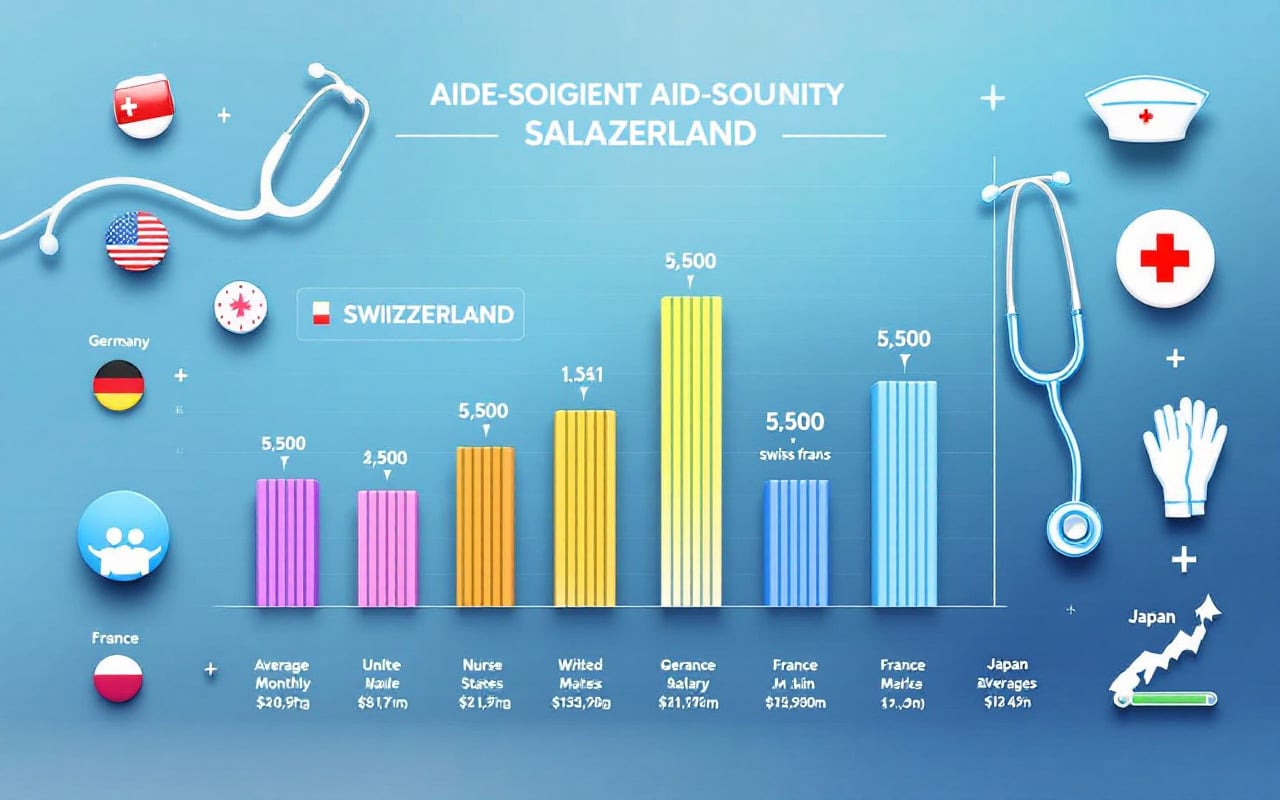- 🔍 Find out why the job of nursing assistant in Switzerland is so rewarding and well paid!
- 💡 Explore the differences between the caregiver role in Switzerland and other countries.
- 💰 Learn all about salary ranges and the factors that influence your earnings.
- 🌍 Discover the advantages of being a cross-border worker and the practical aspects not to be neglected.
- 🚀 Ready to boost your career as a caregiver in Switzerland? Read on to find out more!
Are you thinking about become a caregiver in Switzerland and you are wondering about salary prospects? You are in the right place! The profession of nursing assistant in Switzerland is not only rewarding, but also well paid compared to other European countries. However, salary can vary greatly depending on several factors. In this article, we will dive into the details of the salary of caregivers in Switzerland, explore the factors that influence it, and give you all the information you need to understand what you can hope to gain in this area.
Whether you are already in Switzerland or are considering moving there to work in the healthcare sector, we will cover all the essential aspects: from salary ranges to regional differences, including the specific requirements for practicing this profession in Switzerland. .
Understanding the nursing assistant profession in Switzerland
The roles and responsibilities of caregivers
Imagine yourself as the nurses’ right-hand man, always ready to act. Your mission? Ensure the comfort and well-being of patients. This ranges from help with washing to distributing meals, including taking vital signs. You are also the essential human connection, offering listening and comfort.
Did you know that caregivers in Switzerland often have more responsibilities than in other countries? In fact, they can sometimes administer certain medications or carry out more technical care, under supervision of course.
Differences between caregivers in Switzerland and other countries
Switzerland is a bit like the land of plenty for caregivers! Here, your training and expertise are highly valued. Unlike France for example, where the tasks are more restrictive, you will have the opportunity to develop your skills and broaden your scope of action.
For example, at the Geneva University Hospital, nursing assistants can follow continuing training to specialize in certain areas such as geriatrics or palliative care. This is real added value for your career!
The salary of a caregiver in Switzerland

Now let’s talk about the crux of the matter: salary! You are probably wondering if the game is worth it? Spoiler alert: in Switzerland, caregivers are generally much better paid than in neighboring countries.
Salary ranges: gross and net salary
Hold on tight! On average, a caregiver in Switzerland can expect to earn between 4,000 and 6,000 Swiss francs gross per month. Not bad, is it? Of course, this amount varies depending on several factors that we will explore.
After deducting social security contributions, your net salary will generally range between 3,500 and 5,000 Swiss francs. Enough to offer you a good standard of living, even if the cost of living in Switzerland is higher than elsewhere.
Factors influencing compensation
- Professional experience : Like everywhere, the more years you have in practice, the more your salary increases. A beginner caregiver will earn less than a professional with 10 years of experience.
- Workplace: hospitals, clinics or retirement homes : Salaries may vary depending on the type of establishment. For example, private clinics often offer more attractive remuneration than EMS (medical-social establishments).
- Regions and cantons: geographical disparities : Switzerland is a bit like a salary patchwork! In Zurich or Geneva you will generally earn more than in Ticino or rural cantons.
Comparison with other health professions
Wondering how your salary compares to other healthcare professionals? Well, if nurses earn on average 20% more, you are significantly better off than carers, for example.
The Association of Swiss Caregivers (ACAHS) regularly publishes comparative studies. According to their latest report, caregivers in Switzerland earn on average 30% more than their French counterparts. Something to think about, right?
Recognition and requirements to work as a caregiver in Switzerland
Recognition of foreign diplomas
Are you a caregiver abroad and dream of working in Switzerland? Good news: it’s entirely possible! But be careful, there are a few steps to take.
The Swiss Red Cross is the organization responsible for recognizing foreign diplomas. The process may take a few months, but don’t be discouraged! This is your key to accessing the Swiss job market.
Necessary languages and certifications
In Switzerland, language is serious! Depending on the canton where you want to work, you will need to be fluent in French, German or Italian. A B2 level is generally required. Why not take advantage of your free time to brush up on your language skills?
In addition, certain additional training may be required. For example, certification in cardiopulmonary resuscitation is often required. This is your opportunity to boost your CV!
Adaptation to the standards and practices of the Swiss system
Working in Switzerland also means adapting to a new health system. Protocols may differ from what you are familiar with. But don’t panic! Healthcare establishments often offer integration training.
For example, at the CHUV in Lausanne, new caregivers benefit from a support program lasting several weeks. This is an opportunity to familiarize yourself with local practices and quickly feel comfortable in your new environment.
Practical aspects for cross-border caregivers

Do you live in neighboring France and are you planning to work in Switzerland? You are not the only one! Every day, thousands of cross-border commuters make the journey to enjoy the benefits of working in Switzerland.
Cross-border status and its advantages
Being a border crosser means having the best of both worlds! You benefit from a Swiss salary while enjoying the French cost of living. Not bad, right?
The G license is your sesame. It allows you to work in Switzerland while residing in a neighboring country. Be careful though, you will have to return home at least once a week.
Cost of living in Switzerland vs salary: is it profitable?
The question everyone is asking: is it really financially interesting? The answer is usually yes, but let’s do the math together.
Let’s take a concrete example: a caregiver working in Geneva and living in Haute-Savoie. With a monthly salary of 5,000 Swiss francs (around 4,600 euros), even deducting transport costs and insurance, you will still be well ahead compared to a French salary.
Documents and legislation: work permits and insurance
Working in Switzerland requires a bit of paperwork, but nothing insurmountable! Here are the key steps:
1. Obtain a G permit from the Cantonal Population Office.
2. Join Swiss health insurance (LAMal) or request an exemption if you keep your French insurance.
3. Declare your income in France and Switzerland (don’t panic, there are conventions to avoid double taxation).
Do not hesitate to get help from cross-border associations. They are a mine of valuable information!
Ultimately, working as a caregiver in Switzerland can be a great opportunity to boost your career and your wallet. Ready to take the plunge?
What if you took the step towards a new professional life?
As you have discovered, working as a caregiver in Switzerland is much more than just a change of country – it is a real opportunity for growth, both professionally and personally. Attractive salaries, recognition of the profession and numerous continuing education opportunities make Switzerland a promised land for healthcare professionals. Whether you are already in the field or considering a career change, it is clearly worth it!
Useful links
- Nursing assistant salary in Switzerland in 2024 -Indeed
- Salary Caregiver – JobUp.ch
- Becoming a Caregiver in Switzerland: Training, Salary and Jobs – Become a cross-border worker
- Caregiver Salary in Switzerland -Talent.com
- Google Position Zero: The Ultimate Guide to Hoarding Featured Snippets - 1 March 2025
- SEO 2025: trends to follow to optimize your content strategy - 1 March 2025
- Business management training: The keys to success - 2 January 2025





